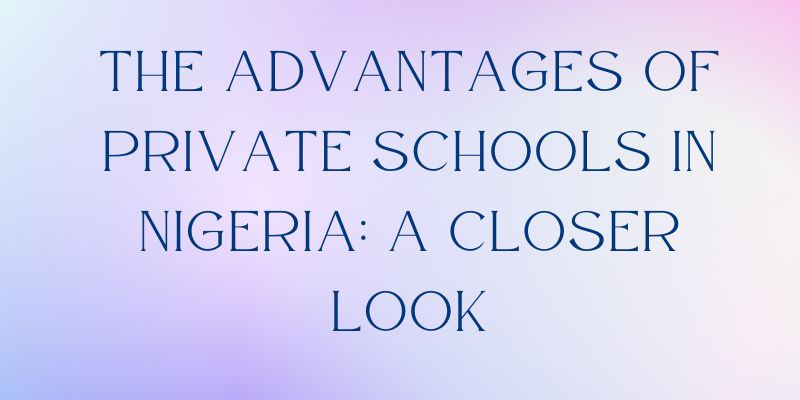Introduction
Private schools in Nigeria have become increasingly popular in recent years, with a growing number of parents opting to send their children to these institutions rather than public schools. This shift towards private education has sparked debates among education experts and policymakers about the benefits and drawbacks of this trend. This article aims to provide an in-depth exploration of the benefits of private schools in Nigeria, including their history, significance, impact, and notable events and figures.
What Are Private Schools?
Private schools are educational institutions that are privately owned and operate outside of government control and funding. These schools charge tuition fees and are often considered more exclusive and provide a higher quality of education compared to public schools. In Nigeria, private schools are commonly known as “secondary schools” and are categorized as either day or boarding schools, with the latter providing accommodation and meals for students.
The History and Significance of Private Schools in Nigeria
Private schools in Nigeria have a long and rich history, with the first recorded private school, CMS Grammar School, established in 1859 by the Church Missionary Society. These schools were initially created to provide education for the children of colonial rulers, missionaries, and wealthy Nigerians. However, in the post-independence era, private schools were opened to cater to the growing demand for education from the middle and upper-class families.
Private schools have gained significant importance and influence in Nigerian society. They are perceived as prestigious institutions and are seen as a symbol of social status and wealth. This has led to the proliferation of private schools, particularly in urban areas, as parents are willing to pay high fees for their children to attend these schools.
The Benefits of Private Schools in Nigeria
1. Quality of Education
Private schools in Nigeria are known for providing a high quality of education compared to public schools. These institutions often have better facilities, resources, and teachers with more qualifications and experience. They also tend to have smaller class sizes, allowing for more individualized attention and a better learning environment for students. This results in improved academic performance and higher success rates for students in national exams.
2. Western Education System
Private schools in Nigeria typically offer a western education curriculum, which is considered more advanced and internationally recognized. This allows students to compete on a global scale, making them more attractive to international universities and job markets. It also exposes students to different methods of learning and thinking, promoting critical thinking and problem-solving skills.
3. More Resources and Extracurricular Activities
Private schools often have more resources and facilities, such as well-equipped laboratories, libraries, and sports fields. This enables students to have a more well-rounded education, with opportunities to engage in extracurricular activities like sports, music, and art. These activities not only promote physical and creative development but also enhance social and leadership skills.
4. Disciplined Learning Environment
Private schools in Nigeria are known for their strict rules and codes of conduct. This creates a disciplined learning environment that promotes respect, responsibility, and self-discipline in students. These values are essential for the personal and academic growth of students and prepare them for future challenges.
5. Flexibility and Innovation
Private schools in Nigeria have more flexibility in terms of curriculum and teaching methods compared to public schools, allowing them to adapt to the needs of students and the changing times. They can incorporate innovative teaching techniques and technologies, making learning more engaging and relevant. This gives students a competitive edge in their academic pursuits and future careers.
6. Focus on Individual Needs
Private schools typically have a lower student-teacher ratio, allowing teachers to focus on the individual needs and strengths of each student. This personalized approach to education can help students reach their full potential and overcome any learning challenges they may face.
7. Network and Connections
Private schools often have a network of influential alumni and strong connections with organizations and businesses. This can provide students with opportunities for internships, mentorships, and employment, giving them a head start in their careers.
Save Money: Tips for Avoiding Labour VAT on Private School Fees
The benefits of private schools in Nigeria are vast and diverse, making them a popular choice among parents and students. These institutions offer quality education, exposure to a western curriculum, and a disciplined learning environment, promoting personal and academic growth. They also provide more resources, extracurricular activities, and a focus on individual needs, preparing students for future challenges and success. While there may be criticisms of the high cost of private education and its potential to perpetuate inequality, the benefits cannot be denied. Private schools have become an essential part of Nigeria’s education system and play a significant role in shaping the country’s future leaders.

Comment Policy:Your words are your own, so be nice and helpful if you can. Please, only use your real name and limit the number of links submitted in your comment. We accept clean XHTML in comments, but don't overdo it, please.Let's have a personal and meaningful discussion.